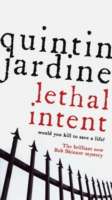 The dominance of English means that almost every major city has either an English language bookstore or a major bookstore with a substantial English language section. During a recent trip to Germany I visited bookstores in Munich and Essen and was able to stock up on crime stories.
The dominance of English means that almost every major city has either an English language bookstore or a major bookstore with a substantial English language section. During a recent trip to Germany I visited bookstores in Munich and Essen and was able to stock up on crime stories.One of these was a recent novel by Quintin Jardine, Lethal Intent. Jardine has written a series of novels based in Edinburgh and featuring Deputy Chief Constable Bob Skinner. Despite this being the fifteenth in the series I had not read any of Jardine's work previously.
This was partly because I have read the books of Ian Rankin, also set in Edinburgh and featuring Inspector John Rebus. Edinburgh is too small a city to have two fictional detectives, especially when one is a DCC. It is also partly because reviews of Jardine's work were less than enthusiastic.
However, reading the blurb on the back of this latest contribution to the series, I came upon this sentence: Ruthless Albanian gangsters have infiltrated Edinburgh's underworld. How could I resist?
Before commenting on Jardine's portrayal of Albanians in the book, I should say that I agree with the reviewers: the book suffers from poor characterisation, stilted dialogue, and an absurd central plot. It is no surprise that Jardine's take on Albania is not exactly sophisticated.
So, to the story. Four Albanians have left their own country and have arrived in Edinburgh. "These were people with known criminal backgrounds, but in Albania that doesn't exactly mark them out," comments Rudoph Sewell of MI5, briefing Skinner and his colleagues.
Later, another MI5 agent provides another briefing. Having identified the 'ruthless gangsters' she comments on Albania itself:
"The early governments were corrupt and allowed the gangsters to take effective control; that still exists, although there are some signs of progress...it is said." She raised a disbelieving eyebrow.
There was a pause as the soldier considered the question. "Very little," he answered, eventually "beyond the stereotype: they're virtually lawless, clannish, very big on blood feuds and into illegality in a big way."
It was his eyes that were compelling: they were a deep brown colour and they seemed to sparkle, radiating danger and an eagerness to do harm.Having finally worked out what the Albanians are up to, Skinner and his men save the day.
The most interesting thing about the story is that the Albanian role is entirely meaningless; in fact, it is absurd. Since I know that no-one reading this is going to be rushing out to buy this book I don't mind giving the plot away.
The Albanians are going to kidnap and then kill Prince William - son of Prince Charles and second in line to the British throne. They are going to do so under the guidance and direction of rogue elements within the British state - army officers and secret agents - who believe that Prince William will destroy the British monarchy by making it too populist.
Now, it is possible that Jardine is making an ironic comment on the stupidity of British establishment. How else can you explain their choice of well-known Albanian gangsters to carry out their plan? Gangsters who, in the course of carrying out their instructions, rob a bank in Holland, blow up a car with a anti-tank missile in Scotland, and murder an MI5 officer. It's not exactly sophisticated or subtle.
But I'm sure there is no irony involved. So why Albanians? I can only think that it is because Albanian gangsters are currently fashionable. We are bored with Italians; even the Russians are old hat these days. So Albanians are now the one-dimensional bad guys of choice whose sole role is to be violent and get killed.
Unfotunately, Jardine is too interested in pursuing his outlandish plot to make any intelligent comment on Albania or Albanians. Even though he has one of his characters acknowledge and name the 'stereotypes' he makes no effort to explore those stereotypes.
A thumbs down for this one both as a portrayal of Albania and as a police story.
Comments
Do you know that Playstation has a videogame where the "events" take place in Albania? What with drug dealing gone awry and the rest of the menu! It appears to me that a consesus is being built on the Albanian Villain. Oh well!
"Cosi fan tutte'" (pun intended)